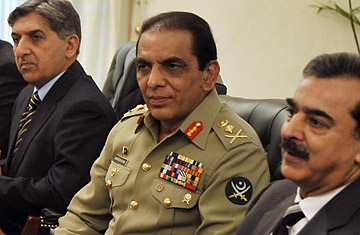
Pakistani army chief General Ashfaq Kayani, center, sits between Pakistani Prime Minister Yousuf Raza Gilani, right, and Lieut. General Ahmad Shuja Pasha of the ISI on June 11, 2011
(2 of 2)
Keen observers of the Pakistani army are highly skeptical of claims of divisions in the top ranks or suggestions that Kayani's own position is imperiled. "My understanding is that there is a debate on different issues within the corps commanders and senior officers from the General Headquarters," says Shuja Nawaz, director of the South Asia Center at the Atlantic Council in Washington. "It is not in the form of pressure on General Kayani as such, but on what to do in response to the criticism." Masood, the retired general, dismisses outright the prospect of the corps commanders easing Kayani out. "All of them are his protégés," he says, noting that Kayani has been responsible for each appointment in his over three years as chief. "What is happening is that there's a collective failure of the military, not the failure of an individual. They all have the same thinking."
Similarly, there are well-founded doubts about a "colonels' coup." Unlike the armies of the Arab world or Latin America, the Pakistani army's chain of command has never been broken. Army chiefs have only been gently eased into retirement by fellow generals after their positions, as military dictators, were deemed too damaging for the institution. Nawaz, a historian of the Pakistani army, recalls that the only junior officers' coup attempt, in 1973, was thwarted in its early stages by military intelligence. But there is one scenario, though perhaps remote, that could provoke unforeseeable consequences. The most worrisome reaction, says the Western diplomat, may come if "there's a further U.S. incursion and soldiers are ordered not to fire on it."
Attempting to placate the lower ranks, the corps commanders recently issued a strongly worded statement pushing back against perceived U.S. pressure. They offered to divert U.S. military aid into the government coffers, ordered that the U.S.'s military presence in Pakistan be diminished to a minimum and lashed out against the CIA's use of drones in the tribal areas. "They have to show their middle ranks that they can be tough," says the Western diplomat. The rhetoric is also reflective of fiercer anti-American sentiment in Pakistan. "The more anti-American you are, the more patriotic you are regarded," laments retired general Masood.
But the rhetoric is not sustainable. It exaggerates the extent to which the top generals are prepared to confront the U.S. Behind closed doors, top U.S. and Pakistani officials have agreed to form a joint-counterterrorism task force that will oversee CIA and ISI intelligence operations in Pakistan; drones will no longer take off from the Shamsi air base in Baluchistan but will continue from Afghanistan, the presence of U.S. Special Forces will discreetly continue, and Pakistan will be included in discussions on an endgame settlement in Afghanistan. "General Kayani does not believe that a worse confrontation with the U.S. will be in his interests," says the Western diplomat.
The rhetoric is also an ill-advised attempt to mask the military's own shortcomings, says retired general Masood. "Their thinking is, 'If the current criticism continues the way it is, then our institution will be completely destroyed.'" But the prickly attitude, revealing little patience with the sort of criticism civilian politicians have endured for decades, risks ignoring important challenges. "The leadership seems to be more worried about image than performance," adds Masood. "They are trying to protect themselves and don't want the light thrown on their weaknesses." What seems missing from the top generals' thinking is that by continuing to meddle in politics, through the control of defense and foreign policies, and not subordinating itself to civilian authority, it will continue to attract hostile attention.
After the U.S. and his own military, the third source of criticism is the Pakistani public, led by opposition politicians, civil-society campaigners and journalists. A major test of Kayani's leadership will come with how the military will respond to two high-profile commissions that have been established to investigate bin Laden's presence in Abbottabad and the murder of journalist Shahzad. With the intense scrutiny, there are hopes of greater transparency and accountability. "Historically, it has never happened," notes analyst Nawaz. But, he adds, "The military is very conscious of trying to meet these statements head-on."
The coming weeks will tell whether Kayani can restore his institution's standing, maintain the alliance with the U.S., win back the support of his junior officers and at the same time demonstrate a commitment to Pakistan's fledgling democracy. Urged in different directions, will the general successfully forge a path out of the labyrinth he now finds himself in?
